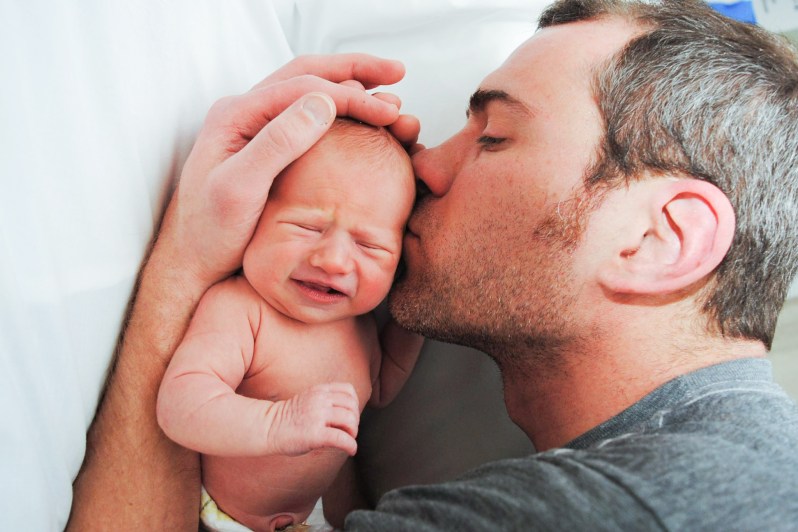Becoming a parent is, as a friend once wisely put it, the most extraordinary ordinary thing a person can do. Billions of us have done it, yet for every single first-time parent, the immensity of the experience is nearly impossible to comprehend until you’re actively living it.

Simply put, until you have kids, you don’t know what it feels like to be a father. (Or mother, but I can only speak to my own experience.) Before having children, I was irked when people with children said that to me; I thought I could very much put myself in their shoes and imagine what it must have felt like to be a dad. Then I became one. They were right.
Fatherhood changes every aspect of your life. You will feel differently about your partner, your parents, your work, your hobbies, your sleep, your diet — all of it. I can’t think of one aspect of my life that was not at least slightly affected by my wife and I having kids. And while objectively I knew parenthood would be rather like that, I did not appreciate how all-encompassing the changes would be.
All that said, I think I was about as well prepared as I could have been for the arrival of our first kid because I genuinely lived the advice I’m sharing.
Before I jump into my recommendations for how you should plan for fatherhood, I’ll posit a simple yet brilliant quote from President Eisenhower, for it applies to parenthood every bit as well as it does to military strategy: “Plans are worthless, but planning is essential.”
Read. Read a Lot
There have long been a plethora of books out there aimed at expectant mothers, but in the past decade or so plenty of good books aimed at dads-to-be have also hit the shelves. My go-to was The Expectant Father by Armin Brott and Jennifer Ash. The book has gone through many editions and been read by millions of soon-to-be dads, and I must have read the bulk of it at least three times over. Skip all the dude-bro dad books out there. While there’s almost always room for levity in life, this journey you’re on is not to be taken lightly.

Beyond that book and any others you might choose, read everything from well-written blogs to papers from the American Academy of Pediatrics to fiction heavily focused on the father-child relationship. (Ivan Turgenev’s Fathers and Sons will do nicely there.) Go ahead and watch some family-centric shows and movies along with your reading. By educating yourself about everything from diapering to baby proofing to sleep training before you are in the thick of it, you’ll be able to master your new skills more quickly. And by regularly visualizing yourself already as a father, you will slip into the role with less effort.
Finish Those Projects Around the House
You know that crack in the drywall you’ve been meaning to fix for weeks? Fix it now, or it might be there for years. Ditto the gutter you need to clean out. And the door that creaks. And every other do-it-yourself project you haven’t done yet. Use the time you have now when you’re still getting enough sleep — when you’re not changing diapers or warming bottles or going to pediatric appointments and so forth — to remove as much from your to-do list as possible. Future dad you will appreciate it.
See Your Friends and Family
Having children turns your life inward. Once you have kids, you will see less and less of your friends and even family members (not in the early weeks perhaps) and will spend more time at home with just your nuclear clan. This is all the more true if your buddies become dads at a similar time. So make some more memories now, and make plans to see the gang periodically once the kid arrives. Scheduling plans far out with your friends will help ensure the get-togethers actually happen, especially as long-term planning can help you get childcare in place if need be.

Clear the Air with Everyone
One of the things most strongly affected by fatherhood is a man’s own emotions. Make sure the communication between you and your partner is wide open and crystal clear. The better your relationship is as you head to the delivery room, the better it will be months and even years down the line. (Y’know, when you finally have a free minute to talk again.)
You will likely come to reevaluate your relationship with your own dad, so if there’s anything that needs to be said there, be it warm and loving or tough but true, say it now. And the same might go for siblings, uncles, cousins, friends, and so on.

Make a Plan at Work
If you work for a company, get to know their parental leave policies ahead of time and talk to your bosses and/or your reports, working out a plan for how much time you’ll take after the birth and how you’re going to manage your workload and your new responsibilities at home in the bigger picture. Wrap up as many big projects as you can at least a couple of weeks before the due date.
Work Out Your New Family Budget
One diaper is not expensive. The 2,500 to 3,000 diapers your baby will go through in the first year? That adds up. So do the wipes, the creams, the PJs, the crib sheets, and on and on it goes. Oh, and the hospital bill. Kids are expensive, but the more you plan ahead, the less the new costs will sting. If you’re on a relatively tight budget, start slowly stocking up with things you know you’ll need now so you don’t have to buy everything in a short period of time. Also, a lot of baby gear is welcome but hardly essential, so in many cases, you can skip it. Looking at you, wipe warmer.
Get Yourself In Shape
Once your kid arrives, your workouts are going to plummet on the priority list, and your general fatigue is going to take a terrible toll on your fitness. If you’re not in decent shape now, do your best to get that way before the baby arrives. And if you are in good shape, start to come up with a routine you can do in minimal time. The multi-hour gym sessions? Those are going to end.

Don’t Worry Too Much and Don’t Be Too Hard On Yourself
Becoming a dad is likely the most existentially powerful thing you will ever do, and there’s a good chance that you’re going to experience as much self-doubt and self-criticism as you ever have. Live through each emotion, then let it go. And once your kid (or kids) arrive, don’t worry if you don’t immediately feel that deep connection of which you’d dreamt. It takes many dads and moms alike days or even weeks to fully connect with their kids. It will happen, just hang in there. And don’t worry if, all your careful prep and planning aside, you feel like you have no clue what you’re doing as a new dad.
One day, faster than you know it, you’ll go from exhausted, at-wits-end, and out of ideas of what the hell to do to calm this newborn down at 3 a.m. dad to hiking through the mountains, kindergartener and wife a few steps ahead on the trail, one-year-old strapped to your back, and … well, still frequently exhausted, but in the driver’s seat, dad wise. Or maybe that exact scenario won’t play out for you, because that one’s mine. But you got this.



